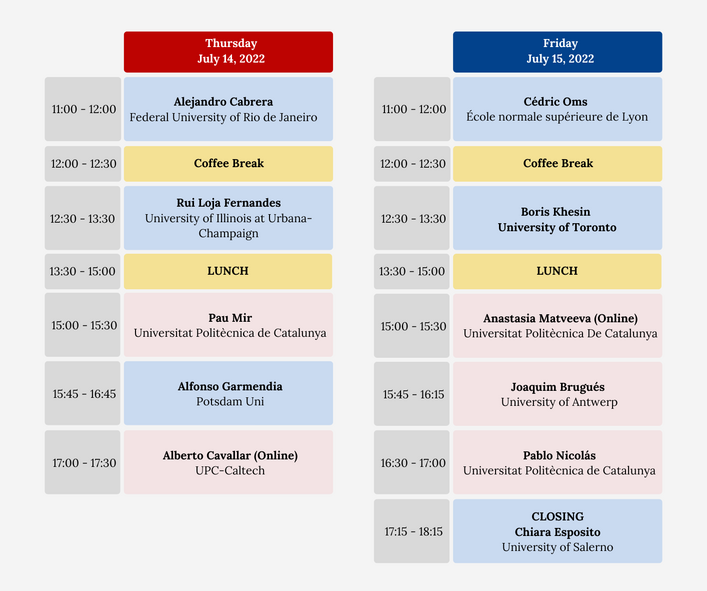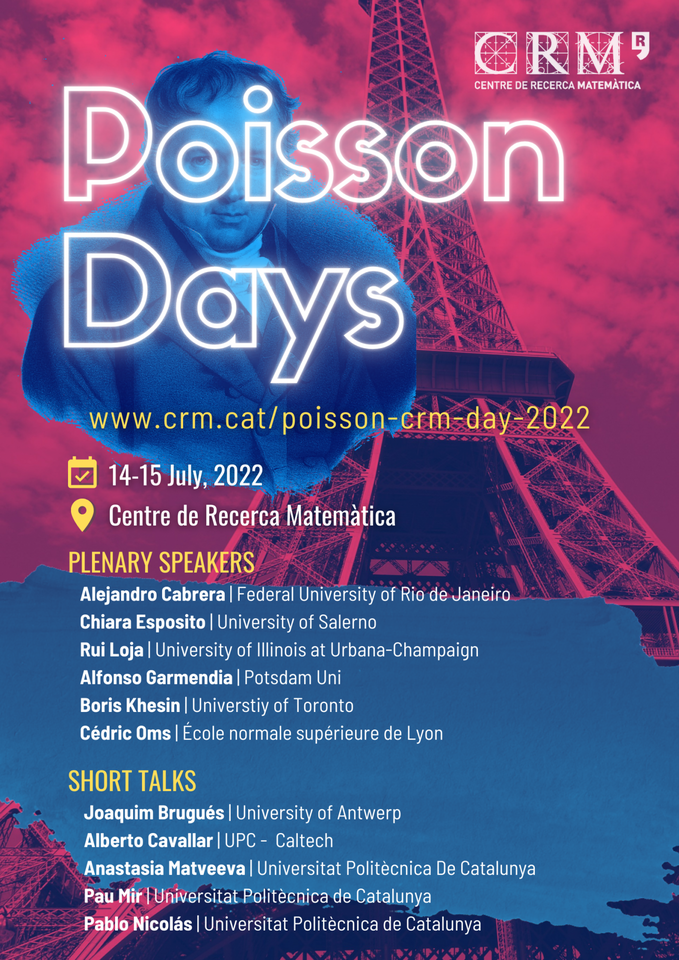This activity is part of the
Poisson CRM Days 2022
Sign into July 15, 2022
Registration is free but mandatory. Limited seats available, the registration will be on a first come, first served basis.
PHOTO GALLERY
Description

Siméon-Denis Poisson, (born June 21, 1781, Pithiviers, France—died April 25, 1840, Sceaux)
As a part of the CRM-ICMAT Joint Intensive Research Programme POISSON, we are celebrating a special Poisson event at CRM during the French National Day in July 14 and 15.
PLENARY SPEAKERS & SHORT TALKS
PLENARY TALKS
On Poisson brackets and quantization
Lluís Santaló Lecturer: Alejandro Cabrera | Federal University of Rio de Janeiro
ABSTRACT
In this talk, we shall review the crucial role that Poisson brackets play in the idea of quantization and, thus, to help establish a connection between the formalisms behind classical and quantum mechanics. We shall first focus on highlighting some of the physical aspects behind these ideas and, finally, try to account for (at least part of) the corresponding wide range of ramifications in mathematics.
ABSTRACT
In this seminar we discuss the compatibility between deformation quantization and phase space reduction. More explicitly, on the classical side one can reduce (formal) Poisson structures with formal momentum maps, and on the quantum side one can reduce equivariant star products. First, we describe these reductions by morphisms of L-infinity algebras. This allows us to rephrase the “reduction commutes with quantization” problem, originally formulated in the setting of geometric quantization, in terms of L-infinity morphisms.
This is a joint project with A. Kraft and J. Schnitzer.
Poisson geometry around Poisson submanifolds
Lecturer: Rui Loja | University of Illinois at Urbana-Champaign
ABSTRACT
The point of departure of this talk is the construction of local linear models around Poisson submanifolds. I will explain that this is not always possible, and that understanding this problem requires a theory of multiplicative Ehresmann connections, which extends the well-known theory of connections on principal bundles. This talk is based on joint work with Ioan Marcut.
ABSTRACT
This talk reviews the notions of (strict) Lie 2-groups and bundle gerbes, actions of Lie 2-groups on a Lie Groupoid and its quotient. Moreover, it shows that for suitable quotients of groupoids there exists a bundle gerbe and viceversa.
Vortex filaments and membranes in the Euler hydrodynamics
Lecturer: Boris Khesin | University of Toronto
ABSTRACT
The binormal (or vortex filament) equation provides an approximation of the 3D incompressible Euler equation. We present a Hamiltonian framework for the binormal equation in higher-dimensions and its explicit solutions that collapse in finite time. By going to lower dimensions we observe a curious appearance of the golden ratio in the motion of point vortices in the half-plane. This is a joint work with C.Yang and H.Wang.
Existence and classification of $b$-contact structures
Lecturer: Cédric Oms | École normale supérieure de Lyon
ABSTRACT
$b$-contact structures are a generalization of contact structures and can be seen as a Jacobi structure which is not transitive but transversally vanishing. Using the $h$-principle, we will give existence results for those structures in dimension 3. Furthermore, the overtwisted/tight dichotomy can be prescribed in each contact leaf of the Jacobi structure. Time permitting, we will classify these structures for some manifolds with a distinguished hypersurface. This is based on joint work with Robert Cardona.
SHORT TALKS
ABSTRACT
Since the beginnings of the development of Floer theory there has been an interest to adapt this construction to non-compact manifolds. In our project, we aim at building one such complex for the open part of b-symplectic manifolds, using a cosymplectic foliation in a tubular neighbourhood near the singular hypersurface. In this talk we will review the concept of Floer complex, its relation to Morse theory, and the steps taken in our project to construct an adapted complex. This is a joint project with Eva Miranda and Cédric Oms.
Extension of the Large Color R-Matrix for Knot Complements to the so(8) case
Lecturer: Alberto Cavallar | UPC – Caltech
ABSTRACT
The Gukov-Manolescu series, denoted by FK(x,q), is a conjectural invariant of knot complements that, in a sense, analytically continues the colored Jones polynomials. In a recent paper, Sunghyuk Park uses the large color R-matrix of sl(2) to study FK for some simple links, giving a definition of FK for positive braid knots and computing FK for various knots and links. This procedure has been extended by Angus Gruen to all other Lie algebras sl(n+1) beyond sl(2). In this work, we turn to the family so(2n) of complex semisimple Lie algebras in Cartan’s classification, mainly focusing on the so(8) case attracted by the three-fold symmetry in its Dynkin diagram D4.
ABSTRACT
Geometric quantization of b-symplectic toric manifolds
Lecturer: Pau Mir | Universitat Politècnica de Catalunya
ABSTRACT
We prove that Bohr-Sommerfeld quantization coincides with formal geometric quantization on symplectic toric and b-symplectic toric manifolds. Taking as starting point the construction of Guillemin-Sternberg, we prove the symplectic case. Taking into account the orientation of the connected components of the critical hypersurface Z, we introduce the Bohr-Sommerfeld quantization for b-symplectic toric manifolds and show that it is determined by its b-Delzant polytope. This is joint work with Eva Miranda and Jonathan Weitsman.
Hamiltonian mechanics and gauge theories on Lie algebroids
Lecturer: Pablo Nicolás | Universitat Politècnica de Catalunya
ABSTRACT
Many singular structures in smooth manifolds, like b-manifolds, bk-manifolds, c-manifolds and, more generally, E-manifolds, are examples of Lie algebroids. With this motivation, we define a canonical Liouville form on the prolongation of the dual of any algebroid 
schedule

Lodging information
ON-CAMPUS AND BELLATERRA
BARCELONA AND OFF-CAMPUS
|
For inquiries about this event please contact the research programs coordinator Ms. Núria Hernández at nhernandez@crm.cat
|



